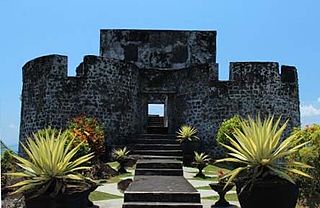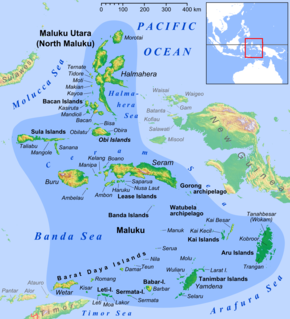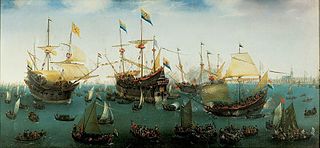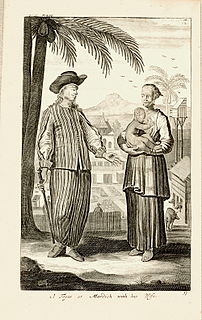 W
WThe Portuguese were the first Europeans to establish a colonial presence in what is now Indonesia. Their quest to dominate the source of the lucrative spice trade in the early 16th century through the Portuguese East India Company, and their simultaneous Roman Catholic missionary efforts, saw the establishment of trading posts and forts, and a Portuguese cultural element that remains in modern-day Indonesia, although not nearly as strong as in neighbouring East Timor.
 W
WAntónio de Abreu was a 16th-century Portuguese navigator and naval officer. He participated under the command of Afonso de Albuquerque in the conquest of Ormus in 1507 and Malacca in 1511, where he got injured. Departing from Malacca in November 1511 with four ships, in an exploratory voyage to the 'Spice Islands' of Maluku, he led the first European expedition to reach Timor and the Banda Islands, in Indonesia, in 1512.
 W
WAmbon Island is part of the Maluku Islands of Indonesia. The island has an area of 743.37 km2 (287.02 sq mi) and is mountainous, well watered, and fertile. Ambon Island consists of two territories - the city of Ambon to the south and various districts (kecamatan) of the Central Maluku Regency to the north. The main city and seaport is Ambon, which is also the capital of Maluku province, while those districts of Maluku Tengah Regency situated on Ambon Island had a 2020 Census population of 128,069. Ambon has an airport and is home to the Pattimura University and Open University, state universities, and a few private universities, which include Darussalam University and Universitas Kristen Indonesia Maluku (UKIM).
 W
WThe Banda Islands are a volcanic group of ten small volcanic islands in the Banda Sea, about 140 km (87 mi) south of Seram Island and about 2,000 km (1,243 mi) east of Java, and constitute an administrative district (kecamatan) within the Central Maluku Regency in the Indonesian province of Maluku. The main town and administrative centre is Bandanaira, located on the island of the same name. They rise out of 4-to-6-kilometre deep ocean and have a total land area of approximately 172 square kilometres (66 sq mi). They had a population of 18,544 at the 2010 Census. Until the mid-19th century the Banda Islands were the world's only source of the spices nutmeg and mace, produced from the nutmeg tree. The islands are also popular destinations for scuba diving and snorkeling.
 W
WThe First Dutch Expedition to Nusantara was an expedition that took place from 1595 to 1597. It was instrumental in opening up the Indonesian spice trade to the merchants that eventually formed the Dutch East India Company, and marked the end of the Portuguese Empire's dominance in the region.
 W
WFlores island is one of the Lesser Sunda Islands, a group of islands in the eastern half of Indonesia. The population was 2,039,373 in the 2020 Census and the largest towns are Maumere and Ende. The name Flores is the Portuguese word for "Flowers".
 W
WFort Kalamata is a coastal star fort that was built by the Portuguese on the island of Ternate in Indonesia's Maluku Islands. Formerly known as Benteng Kayu Merah because it is located in Kayu Merah village, Originally the fort was named Santa Lucia, but later it became famous for Fort Kalamata. Kalamata itself comes from the name Pengeran Kalamata, the younger brother of the Sultan of Ternate Madarsyah
 W
WFort Tolukko is a small fortification on the east coast of Ternate facing Halmahera. It was one of the colonial forts built to control the trade in clove spices, which prior to the eighteenth century were only found in the Maluku Islands. It has been variously occupied by the Portuguese, the native Ternate Sultanate, the Dutch, the British and the Spanish. It was abandoned as a fort in 1864, renovated in 1996, and is now a tourist attraction.
 W
WThe Luso-Sundanese padrão is a padrão commemorating a treaty between the kingdoms of Portugal and Sunda, better known as the Luso-Sundanese Treaty of Sunda Kalapa.
 W
WThe Maluku Islands or the Moluccas (Molukken) are an archipelago in eastern Indonesia. Tectonically they are located on the Halmahera Plate within the Molucca Sea Collision Zone. Geographically they are located east of Sulawesi, west of New Guinea, and north and east of Timor. Lying within Wallacea, the Maluku islands have been considered part of both Asia and Oceania.
 W
WThe so-called Portuguese Fort, or Benteng Portugis, is a historical fort located in the village Banyumanis adjacent to the village of Ujung Batu, District of Keling, district of Jepara, the province of Central Java, Indonesia. It is said that the fortress was built by the Government Mataram in 1613–1645, with partnership of the Portuguese as the central defense to repel the enemy who came from Java Sea.
 W
WThe Second Dutch Expedition to Nusantara was an expedition that took place from 1598 to 1600, one of the Dutch forays into the Indonesian spice trade that led to the establishment of the Dutch East India Company. It was led by Jacob Cornelius van Neck.
 W
WFrancisco Serrão was a Portuguese explorer and a cousin of Ferdinand Magellan. His 1512 voyage was the first known European sailing east past Malacca through modern Indonesia and the East Indies. He became a confidant of the Sultan Bayan Sirrullah, the ruler of Ternate, becoming his personal advisor. He remained in Ternate where he died around the same time Magellan died.
 W
WSolor is a volcanic island located off the eastern tip of Flores island in the Lesser Sunda Islands of Indonesia, in the Solor Archipelago. The island supports a small population that has been whaling for hundreds of years. They speak the languages of Adonara and Lamaholot. There are at least five volcanoes on this island which measures only 40 kilometres by 6 kilometres. The island's area is 226.34 square kilometres, and it had a population of 34,029 at the 2020 Census.
 W
WThe Maluku Islands or the Moluccas (Molukken) are an archipelago in eastern Indonesia. Tectonically they are located on the Halmahera Plate within the Molucca Sea Collision Zone. Geographically they are located east of Sulawesi, west of New Guinea, and north and east of Timor. Lying within Wallacea, the Maluku islands have been considered part of both Asia and Oceania.
 W
WTernate is a city in the Indonesian province of North Maluku and an island in the Maluku Islands. It was de facto provincial capital of North Maluku before Sofifi on the nearby coast of Halmahera became the capital in 2010. It is off the west coast of the much larger island of Halmahera. It is composed of eight islands; Ternate, the biggest and main island of the city, as well as seven smaller islands of Moti, Hiri, Tifure, Mayau, Makka, Mano, and Gurida. In total, the city has land area of 162.17 square kilometers with total population of 205,001 according to 2020 Census and density of 1,264.11 per square kilometer. The biggest and most densely populated city in the province, it is the economic, cultural, and education center of North Maluku as well as hub to neighbouring regions. Historically the capital of powerful Sultanate of Ternate in 15th and 16th centuries, it fought bitter rivalry with Tidore Sultanate over control of spice trade in Moluccas and became main interest of competing European powers.
 W
WTimor is an island at the southern end of Maritime Southeast Asia, in the north of the Timor Sea. The island is divided between the sovereign states of East Timor on the eastern part and Indonesia on the western part. The Indonesian part, also known as West Timor, constitutes part of the province of East Nusa Tenggara. Within West Timor lies an exclave of East Timor called Oecusse District. The island covers an area of 30,777 square kilometres. The name is a variant of timur, Malay for "east"; it is so called because it lies at the eastern end of the Lesser Sunda Islands. Mainland Australia is less than 500 km away, separated by the Timor Sea.
 W
WTopasses were a group of people led by the two powerful families – Da Costa and Hornay – that resided in Oecussi and Flores. The Da Costa families were descendants of Portuguese Jewish merchants and Hornay were Dutch.